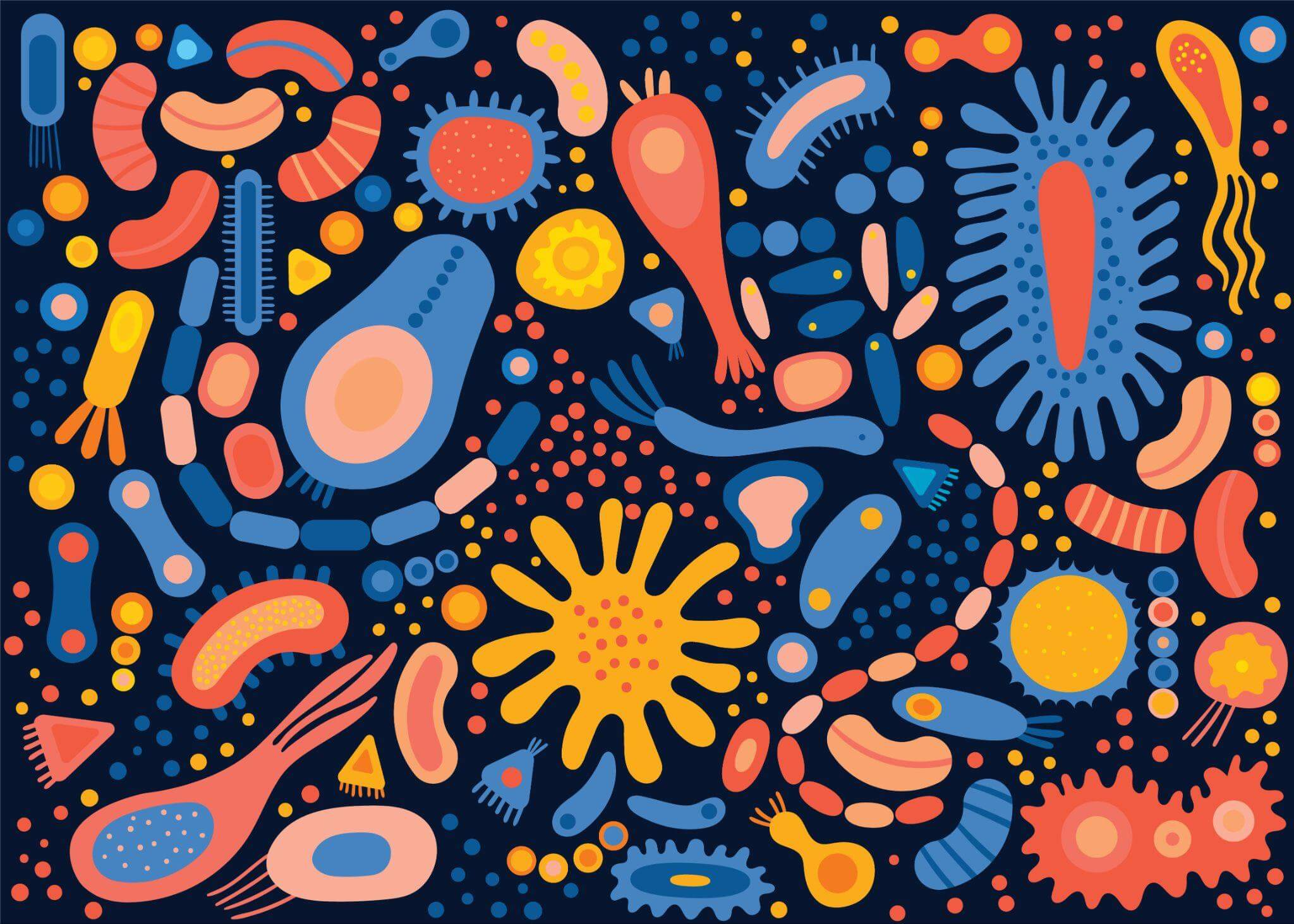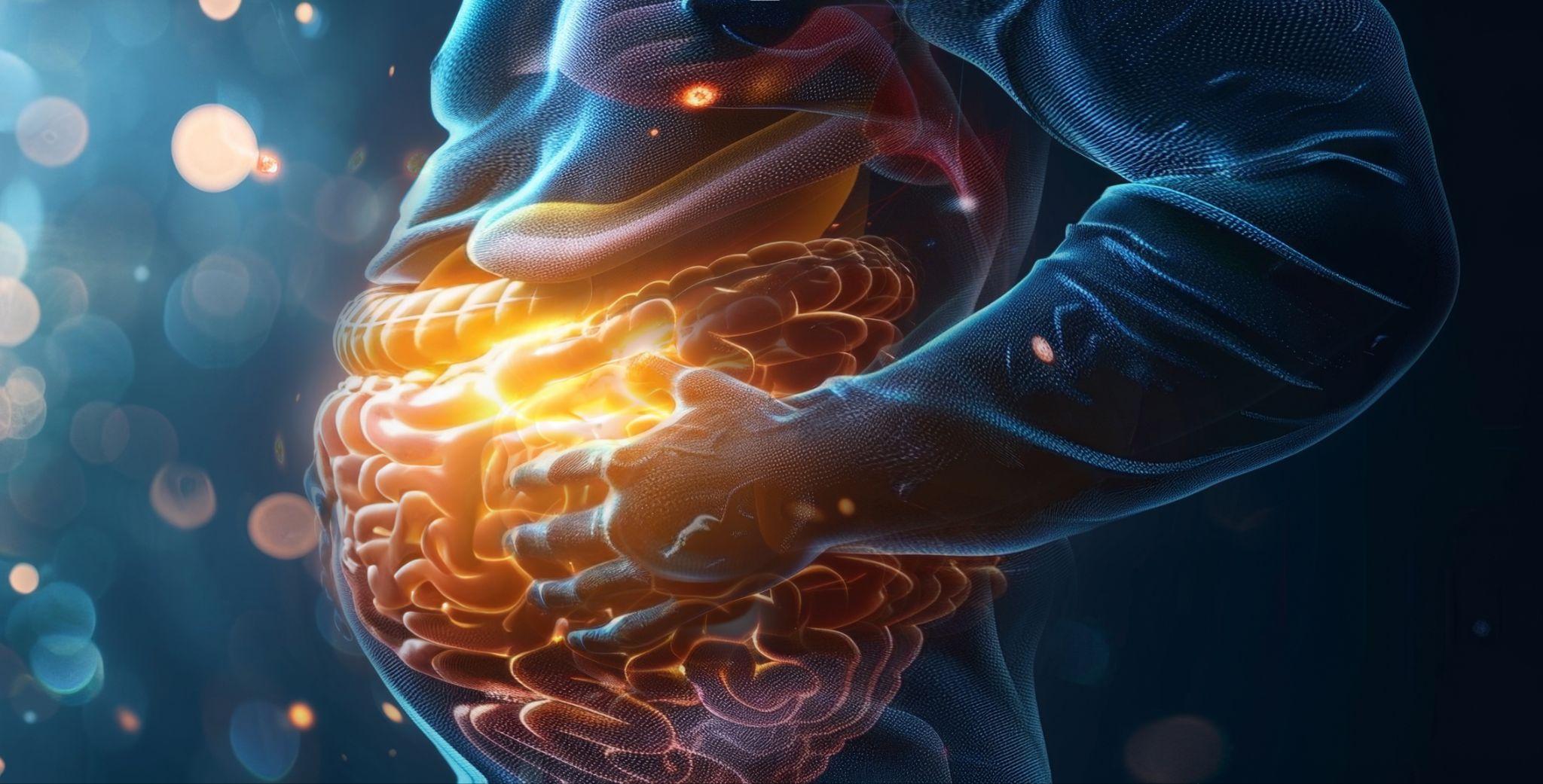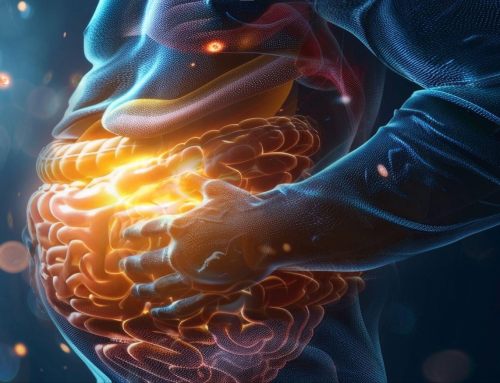How Are GI Disorders Related to the Microbiome?
The gut microbiome harbors an estimated ten trillion to quintillion diverse microorganisms (1). The microbiome refers to the set of genes that are expressed by these microorganisms — including bacteria, fungi, viruses, parasites, and archaea—collectively referred to as microbiota (2). Composition of the microbiome has an integral role in regulating homeostasis in the body. A growing body of research highlights the influence of the microbiome in the development of gastrointestinal disorders (3).
The Gut Microbiome “Supersystem”
The gut microbiome ecosystem is indeed a supersystem. Roughly 1000 different bacterial strains have been identified in the gut microbiome with important regulatory functions for the body and brain (4). Beneficial microbiota are largely involved in regulating the process of digestion – breaking down foods into nutrients the body can absorb and utilize. In addition to modulating digestion, the microbiome has roles in regulating inflammation and immunity, as beneficial bacteria fight against pathogens and toxins to maintain balance in the system (5).
Individual genetic variation and diversity exist in the microbiome. More than 3 million microbial genes reside in the gut microbiome, far exceeding that of the human genome, with an estimated 150 times more unique genes (6). This highlights the epigenetic implications of effectively addressing the microbiome. We can alter gene expression in optimal ways by simply nourishing this extensive ecosystem.
The gut microbiome is dynamic. Gut microbiota continually shape and shift as they collectively respond to cues from the body and environment— relative to nutrition, stressors, toxins, sleep, and movement. Microbiome alterations can occur as microbiota pick up and respond to signals of safety or stress in the body. Over time, chronic stress can affect microbial diversity and weaken the gut lining. This speaks to the bidirectional signaling pathway between the gut microbiome and the brain.
Factors That Influence Microbiome Health & GI Disorders:
Microbial Balance & Dysbiosis – Gut microbial balance (the quality, diversity, and abundance of species) is significant in regulating a healthy microbiome to fulfill its integral roles while having an impact on gut functioning. A healthy composition of the microbiome is not only imperative for adequate digestion and absorption of nutrients, but also for the synthesis of neurotransmitters, vitamins, and hormones. Dysbiosis, or imbalance of microbiota in the gut, has been associated with gut barrier dysfunction and a number of GI disorders, as well as compromised immune, metabolic, and neurological health (7). Whereas “eubiosis” refers to healthy diversity, quality, and abundance of beneficial species in the microbiome with a positive influence on health.
Microbial diversity influences the integrity and functions of the gastrointestinal (GI) barrier. The ratio of beneficial bacteria to pathogenic bacteria is significant to the health of the microbiome and functions of the gut. The composition of the microbiome, including diversity and abundance, is also important with the right ratios of microbiota species, because the gut microbiome balance has a role in modulating intestinal permeability and inflammation. Therefore, compromised intestinal barrier function and inflammation can result from an imbalance in gut microbiota.
While a number of species can have favorable effects on the gut ecosystem, a number of pathogenic strains can produce endotoxins, such as Lipopolysaccharides (LPS), which induce more inflammation and toxicity in the system. Beneficial microbiota cannot thrive in an inflamed gut, so addressing inflammation and microbial balance is vital for gut health.
An example of this is Small Intestinal Bacterial Overgrowth (SIBO) – an overgrowth of bacteria in the small intestine – that has been found to be highly prevalent in Irritable Bowel Syndrome (IBS) and suggested to be a manifestation of dysbiosis (8).
Intestinal Integrity & Permeability – Intestinal permeability, or leaky gut, can result from microbial imbalance such as dysbiosis, as well as from chronic stress and irritants to the GI tract – including food sensitivities, toxicants, additives, or gluten. Intestinal permeability then leads to inflammation in the gut and overall system. This is compounded by stress, poor sleep, and insufficient nutrition.
A healthy gut barrier is important as it acts as a physical, immunological defense against toxins, viruses, food antigens, and bacteria. It is selectively permeable and, when functioning properly, allows for the translocation of nutrients (including short-chain fatty acids, electrolytes, amino acids, water, and select microbial metabolites) from the intestinal linen into circulation in the system (3) while concurrently excluding toxins, antigens, and microbial pathogens that can otherwise burden the system (9).
A healthy, diverse microbiota strongly influences the functions of the intestinal barrier (3). For instance, strains of Akkermansia are needed for mucus production and in regulating inflammation in the microbiome. A decrease in mucus production can result in a compromised mucosal layer, which can further contribute to intestinal permeability and inflammation (10).
Systemic Inflammation – Modulates & Contributes – Increased intestinal permeability, as emphasized, results in systemic inflammation, as endotoxins are able to enter into systemic circulation. Therefore, intestinal permeability induces chronic inflammation in the system while compromising the integrity of the blood-brain barrier (BBB) by disrupting tight protein junctions (3). This has been evidenced by an increase in proinflammatory cytokines, including interleukin (IL)-18, IL-1, IL-6, and TNF-α.
Over time, this has also been suggested to alter brain functions, as toxic microbial metabolites can leak through and increase the production of cytokines while compromising immunity (1). It is also noteworthy that systemic inflammation and intestinal permeability underlie a number of chronic conditions and GI disorders (3).
Homeostasis & Dysregulation in Mind-Body Signaling – Altered gut composition, such as dysbiosis, compromises communication between the body and the brain and has been implicated in IBS, IBD, and SIBO. As noted, dysbiosis is evidenced by an increased number of pathogenic microbes that produce proinflammatory cytokines, with a decreased number of beneficial microbes that have anti-inflammatory and health effects (1).
The ecosystem of the GI tract regulates the physiology of the central nervous system via microbiota and the microbiome-gut-brain axis (MGB) (1). This axis is significant for communicating with all other body systems. The GI microbiota communicates bi-directionally with the brain through the neuroendocrine, immune, and autonomic nervous systems. Dysfunction in this signaling can result in the pathophysiology of various gut disorders, as well as compromising immune and mental health (1).
Modification of gut microbiota composition and diversity of their metabolites can compromise the production of important neurotransmitters (including 5-HT, dopamine, glutamate, and noradrenaline) significant for mood. This can further contribute to dysregulation amongst the microbiome-gut-brain axis (MGB).
Stress can induce changes in the microbiome, as it compromises production of bile, pancreatic digestive enzymes, neurotransmitters, and vitamins. Chronic stress can negatively impact microbial diversity and intestinal barrier function and induce inflammation in the system. A healthy gut microbiome supports modulation of inflammation, immune function, neurotransmitters, and hormones – all having an impact on stress and mood. As emphasized, microbial dysbiosis has been associated with neuropsychological symptoms, further underscoring this connection (8).
Research Shows the Gut Microbiome’s Influence in the Development of GI Disorders
Emerging research findings demonstrate a connection between gut dysbiosis, altered intestinal permeability, systemic inflammation, and the development of GI disorders with support for those with celiac disease, SIBO, inflammatory bowel disease (IBD), and irritable bowel syndrome (IBS) (3). An altered composition of microbiota, such as that seen in dysbiosis, disrupts balance in the body and can lead to the development of these GI disorders (11). The etiology of these disorders is also governed by interactions among gut microbiota, environment, and genetics (12).
A correlation between the gut microbiome and intestinal pathologies in IBD was revealed in this study. Fecal DNA was collected from a cohort of 124 individuals that included both those with IBD and healthy controls. It was found that the abundance of bacterial species was different between IBD patients and healthy controls (13). Those with IBD had decreased diversity and an increase in harmful metabolites and pro-inflammatory factors.
Similar findings were revealed in further studies relative to IBS. Patients with IBS had increased microbial amounts of Firmicutes to Bacteroidetes ratio, Clostridium, and Ruminococcus, among higher amounts of pathogenic microbiota, with marked reductions in Bifidobacterium, Faecalibacterium, Bacteroides, and subsequent beneficial microbiota (1).
Studies conducted in individuals with IBD, Celiac Disease, and Ulcerative Colitis found increased concentrations of Gamma–proteobacteria, Enterobacteriaceae, and Clostridium spp., among other pathogenic strains (15). Decreased microbial diversity was also evident for Firmicutes, Bacteroidetes, Lachnospiracheae, Roseburia, Phascolarctobacterium, and other beneficial strains (13, 15).
A further study found support for the role of dysbiosis in GI disorders, notably IBS pathology. In comparison to healthy controls, participants with IBS had marked increases in pathogenic microbiota such as Ruminococcus, Dorea, and Clostridium, in addition to marked reductions of beneficial microbiota such as Bifidobacterium and Faecalibacterium spp. (16).
Microbiota composition was analyzed in 62 fecal samples of IBS patients and 46 healthy controls. The microbiota composition of IBS patients was found to be significantly different than that of healthy controls, with a 2-fold increase in the ratio of Firmicutes to Bacteroidetes among IBS participants, in comparison to healthy controls. These findings suggest the involvement of various pathogenic bacterial groups in the pathology of IBS, with a lack of beneficial groups (16).
A 2019 systematic review identified various strains of pathogenic microbiota associated with the composition of the microbiome of those with IBS, such as phylum Proteobacteria and the Enterobacteriaceae family, among other pathogenic microbes (17).
Subsequent findings have discovered significant reductions in the diversity and abundance of beneficial bacteria in patients with IBD, such as dysbiosis, further illustrating the significance of the gut microbiota in the the etiology of these conditions (18).
Celiac disease is an immune-mediated inflammatory disease of the small intestine triggered by the consumption of gluten. Recent findings suggest that this autoimmune condition also has marked alterations in microbiota composition, SCFA synthesis, and further modifications in the GI metabolic profile (19). Additional studies have also revealed the impact of alterations in the gut microbiota and the progression of Celiac Disease (20). Dysbiosis has also been implicated in patients with IBD, with decreased abundance of Faecalibacterium prausnitzii that has been found to increase inflammation in those with IBD and Celiac Disease (21).
Nourish & Nurture The Microbiome
Certain patterns exist in the microbiome that influence the health and function of the ecosystem, as well as the integrity of the intestinal barrier function. Functional lab testing relative to the microbiome provides a wealth of information and profound insight into the health and functioning of this vast ecosystem. These assessments can allow for more efficient and personalized targeted interventions for the individual and their unique microbiome.
There are a number of holistic approaches to nourishing the gut. Breathwork, intentional movement, and getting outside in various ecosystems can be beneficial for improved health and diversity of the microbiome. Sufficient sleep is also significant in regulating microbiome health. In fact, microbiome diversity was found to be positively correlated with improved sleep quality in this recent study, with notable diversity and abundance in bacterial phyla (22), underscoring the role of sleep in the health and diversity of the gut microbiome.
Nutrition is also incredibly significant. Consuming a variety of colorful vegetables and following an anti-inflammatory nutrient dense diet similar to the Mediterranean Diet has been suggested to improve microbiome health. However, assessments can provide more specialized recommendations related to optimizing the microbiome, based on one’s individual microbiome profile.
Results obtained can yield more efficient personalized nutrition and supplement support regimens. Depending on the results, increasing intake of polyphenols, probiotics, and prebiotics may be recommended, along with increasing dietary fiber, resistant starches, and fermented foods. Digestive enzymes, turmeric, omega-3s, zinc-carnosine, apple cider vinegar, or betaine HCL may also be recommended for additional support, depending on individual test results. Decreasing consumption of gluten and processed foods may also be supportive in improving the quality, diversity, and functions of the microbiome, including the integrity of the intestinal barrier. Mindful eating is also incredibly valuable in optimizing digestion and nutrition and improving microbiome health.
There are far reaching implications for improving health through the microbiome, containing vast genetic information. We can exert a profound influence on expressing the sea of genes comprising the microbiome in favorable ways that support our health by simply nourishing this incredibly dynamic and functional ecosystem.
Improve The Ecosystem, Optimize Health
The role the microbiome exerts on health is certainly profound, with exciting implications for advancing treatments for those with GI disorders and improving nearly all facets of health.
Learn more during our informative 2-part event on Advances in the Management of Gastrointestinal Disorders: Upper and Lower GI Issues and Their Relationship to the Microbiome. Please note that you register separately for each event.
Part One will occur on March 19th from 5-7 pm PST. A large focus will be on understanding the structure and function of this digestive supersystem and its interactions with all of the body’s systems.
Jeffrey Bland, PhD will open with an introduction to the GI Supersystem, then Kate Henry, ND, will discuss the importance of assessing the function of this GI supersystem, with Malisa Carullo, ND, delving into the connection between the GI microbiome and chronic IBS. Part one will conclude with a thought-provoking panel discussion among the speakers.
Part Two will take place on March 26th from 5-7 pm PST with experts Michael Ruscio, DC, Jeffrey Bland, PhD, and Kate Henry, ND. This event will focus on advancing clinical understanding of how to accurately assess modifications in the function of the GI supersystem while developing personalized approaches to target upper and lower GI disorders.
References:
- Anand N, Gorantla VR, Chidambaram SB. The Role of Gut Dysbiosis in the Pathophysiology of Neuropsychiatric Disorders. 2022 Dec 23;12(1):54. doi: 10.3390/cells12010054. PMID: 36611848; PMCID: PMC9818777.
- Zubeldia-Varela E, Barker-Tejeda TC, Obeso D, Villaseñor A2, Barber D, & Pérez-Gordo M. Microbiome and Allergy: New Insights and Perspectives. J Investig Allergol Clin Immunol 2022; Vol. 32(5): 327-344 doi: 10.18176/jiaci.0852
- Ghosh S, Whitley CS, Haribabu B, Jala VR. Regulation of Intestinal Barrier Function by Microbial Metabolites. Cell Mol Gastroenterol Hepatol. 2021;11(5):1463-1482. doi: 10.1016/j.jcmgh.2021.02.007. Epub 2021 Feb 18. PMID: 33610769; PMCID:
- Ley R., Peterson D., Gordon J. (2006a) Ecological and evolutionary forces shaping microbial diversity in the human intestine. Cell 124: 837–848
- Zhu B, Wang X, Li L. Human gut microbiome: the second genome of human body. Protein Cell. 2010 Aug;1(8):718-25. doi: 10.1007/s13238-010-0093-z. Epub 2010 Aug 28. PMID: 21203913; PMCID: PMC4875195.
- Qin, J.; Li, R.; Raes, J.; Arumugam, M.; Burgdorf, K.S.; Manichanh, C.; Nielsen, T.; Pons, N.; Levenez, F.; Yamada, T.; et al. A Human Gut Microbial Gene Catalog Established by Metagenomic Sequencing. Nature 2010, 464, 59–65.
- Bjarnason I., MacPherson A., Hollander D. Intestinal permeability: an overview. 1995;108:1566–1581.
- Takakura W, Pimentel M. Small Intestinal Bacterial Overgrowth and Irritable Bowel Syndrome – An Update. Front Psychiatry. 2020 Jul 10;11:664. doi: 10.3389/fpsyt.2020.00664. PMID: 32754068; PMCID: PMC7366247.
- Kunzelmann K., Mall M. Electrolyte transport in the mammalian colon: mechanisms and implications for disease. Physiol Rev. 2002;82:245–289
- Carabotti, M.; Scirocco, A.; Maselli, M.; Severi, C. The Gut-Brain Axis: Interactions between Enteric Microbiota, Central and Enteric Nervous Systems. Gastroenterol. Q. Publ. Hell. Soc. Gastroenterol. 2015, 28, 203–209.
- Banaszak M, Górna I, Woźniak D, Przysławski J, Drzymała-Czyż S. Association between Gut Dysbiosis and the Occurrence of SIBO, LIBO, SIFO and IMO. Microorganisms. 2023 Feb 24;11(3):573. doi: 10.3390/microorganisms11030573. PMID: 36985147; PMCID: PMC10052891.
- Ananthakrishnan AN. Epidemiology and risk factors for IBD. Nat Rev Gastroenterol Hepatol. 2015;12:205–217.
- Qin J, Li R, Raes J, Arumugam M, Burgdorf KS, Manichanh C, Nielsen T, Pons N, Levenez F, Yamada T, Mende DR, Li J, Xu J, Li S, Li D, Cao J, Wang B, Liang H, Zheng H, Xie Y, Tap J, Lepage P, Bertalan M, Batto JM, Hansen T, Le Paslier D, Linneberg A, Nielsen HB, Pelletier E, Renault P, Sicheritz-Ponten T, Turner K, Zhu H, Yu C, Li S, Jian M, Zhou Y, Li Y, Zhang X, Li S, Qin N, Yang H, Wang J, Brunak S, Doré J, Guarner F, Kristiansen K, Pedersen O, Parkhill J, Weissenbach J; MetaHIT Consortium; Bork P, Ehrlich SD, Wang J. A human gut microbial gene catalogue established by metagenomic sequencing. Nature. 2010 Mar 4;464(7285):59-65. doi: 10.1038/nature08821. PMID: 20203603; PMCID: PMC3779803.
- Rajilić-Stojanović M, de Vos WM. The first 1000 cultured species of the human gastrointestinal microbiota. FEMS Microbiol Rev. 2014 Sep;38(5):996-1047. doi: 10.1111/1574-6976.12075. Epub 2014 Jun 27. PMID: 24861948; PMCID: PMC4262072.
- Frank D.N., St Amand A.L., Feldman R.A., Boedeker E.C., Harpaz N., Pace N.R. Molecular-phylogenetic characterization of microbial community imbalances in human inflammatory bowel diseases. Proc Natl Acad Sci U S A. 2007;104:13780–13785.
- Rajilić-Stojanović M, Biagi E, Heilig HG, Kajander K, Kekkonen RA, Tims S, de Vos WM. Global and deep molecular analysis of microbiota signatures in fecal samples from patients with irritable bowel syndrome. Gastroenterology. 2011 Nov;141(5):1792-801. doi: 10.1053/j.gastro.2011.07.043. Epub 2011 Aug 5. PMID: 21820992.
- Pittayanon R, Lau JT, Yuan Y, Leontiadis GI, Tse F, Surette M, et al. Gut microbiota in patients with irritable bowel syndrome-a systematic review. Gastroenterology. 2019;157:97–108.
- Manichanh C, Borruel N, Casellas F, Guarner F. The gut microbiota in IBD. Nat Rev Gastroenterol Hepatol. 2012;9:599–608.
- Di Cagno R, De Angelis M, De Pasquale I, et al. Duodenal and faecal microbiota of celiac children: molecular, phenotype and metabolome characterization. BMC Microbiol. 2011;11:219. doi: 10.1186/1471-2180-11-219.
- Cenit MC, Olivares M, Codoñer-Franch P, Sanz Y. Intestinal microbiota and celiac disease: cause, consequence or coevolution? 2015;7:6900–6923
- Chow J, Tang H, Mazmanian SK. Pathobionts of the gastrointestinal microbiota and inflammatory disease. Curr Opin Immunol. 2011;23:473–480.
- Smith RP, Easson C, Lyle SM, Kapoor R, Donnelly CP, Davidson EJ, Parikh E, Lopez JV, Tartar JL. Gut microbiome diversity is associated with sleep physiology in humans. PLoS One. 2019 Oct 7;14(10):e0222394. doi: 10.1371/journal.pone.0222394. PMID: 31589627; PMCID: PMC6779243.












